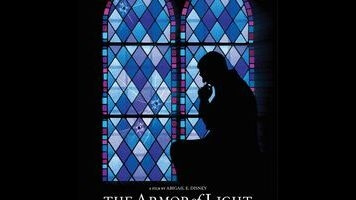The most effective parts of The Armor Of Light have to do with that defense. Disney weaves in footage from NRA conventions and speeches, and then shows Schenck trying to talk with his own people about guns and being met with stubborn resistance and talking points. More than once he hears other evangelicals say that “guns don’t kill people” and that “the only thing that stops a bad guy with a gun is a good guy with a gun”—both direct quotes from NRA executive Wayne LaPierre. The conversations Schenck has in fellowship halls and Christian leadership conferences are bracing, as the pro-gun crowd quickly dismisses his concern by arguing there’s no contradiction between opposing abortion and killing a criminal, because both are about “protecting the innocent.”
Disney creeps right up the edge of the most troubling part of this argument: namely, whether “the innocent” equates to “the white.” Schenck, who was born into a culturally Jewish family and then converted, talks briefly about his own awareness of the racial component of gun fever; and members of McBath’s church community share with him their experiences of teaching their kids what “law and order” really means. But The Armor Of Light largely shies away from digging deeper—perhaps because it’s trying to paint the proliferation of guns as an issue that affects everyone, regardless of race.
To that end, the movie also seems to shrink away whenever a scene becomes too confrontational. The Armor Of Light doesn’t make its points while watching a situation unfold—unlike another excellent recent documentary about an inconveniently Christian pastor, The Overnighters—but rather uses intense in-the-moment scenes as illustrations of what Schenck and McBath are going through, before retreating to calmer talking-head interviews and voice-over narration. That, coupled with the wall-to-wall music, makes The Armor Of Light feel more conventional than it needs to be, and thus less illuminating. A person could watch just the first 20 minutes of the film and would know pretty much all there is to know about what’s in the rest.
But “pretty much” isn’t everything, and the main reason to see The Armor Of Light is to spend more time with Schenck, and to get a sense of how deeply he’s thought about all of this. He offers some necessary, personal perspective on the evolution of the evangelical movement: from being populated by left-leaning Carter voters to becoming rock-ribbed Reaganites. He wonders whether the appeal of catchphrases and easy answers has duped millions of well-meaning people into becoming unwitting shills for gun manufacturers, as they keep moving the line of what’s acceptable. Defending against evildoers is all well and good, but to Schenck, when Sarah Palin gets a round of applause at an NRA gathering for saying, “Ammo’s expensive… don’t waste a bullet on a warning shot,” that should also be “a crisis of conscience” for any Christian who claims to value human life.

